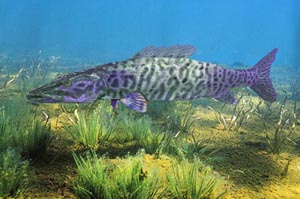Difference between revisions of "Parvil"
From World of Entorais Wiki
Jump to navigationJump to searchm (categories and content) |
m (Text replacement - "Sub-Species" to "Notable Sub-Species") |
||
| (6 intermediate revisions by the same user not shown) | |||
| Line 1: | Line 1: | ||
== | [[File:parvil.png|thumb|right|100x|Parvil - "Sebastian Romu" © 2014]] | ||
==About== | |||
;Common Names: | ;Common Names:Parvil | ||
:These large, long bodied marine fish are commonly found in weed beds or near sunken trees and the like. From such cover they dart out and capture smaller fish. They are capable of incredible bursts of speed. | |||
==Description== | ==Description== | ||
;Classification: | ;Classification:Fish | ||
;Size: | ;Size: 6-7 kilograms (14-16 pounds), 1 metre (40 inches) length | ||
;Appearance: | ;Appearance: Long bodied, with a flat wide jaw. Striped silver and dark green patterning, Their scales will flash a iridescent purple in sunlight. | ||
;Sexual | ;Sexual Dimorphism: | ||
;Variance: | ;Variance:Sub-species vary in size, colour and patterning. | ||
==Ecology== | ==Ecology== | ||
;Habitat: | ;Habitat:Beds of sea grass, reeds, and reefs. | ||
;Diet: | ;Diet:Carnivores. Parvil eat a variety of smaller fish, and marine animals. | ||
==Behaviour== | ==Behaviour== | ||
;Social | ;Social Grouping:Solitary | ||
;Temperament: | ;Temperament:Aggressive, These fish will attack larger animals that stray into their territory. | ||
;Intelligence: | ;Intelligence:Animal | ||
;Reproduction: | ;Reproduction:This species spawns on rocky patches of the sea floor once per year in mid winter. Females will lay eggs about three dozen eggs and guard the brood until they are capable of hunting for themselves. | ||
:The parvil has a symbiotic relationship with the [[golus]], a poisonous marine snail. The parvil’s brood scrapes are also the nesting sites of the golus. By virtue of their relationship, the parvil is one of the few creatures immune to the toxic gel secreted by the golus. | |||
==Sub-Species== | ==Notable Sub-Species== | ||
:Sub-species vary in size, colour, and patterning. | |||
==Domestication== | ==Domestication== | ||
;General: | ;General:No domestication. | ||
;Resources:<-- | ;Resources:Meat | ||
==Stories== | |||
<div style="column-count:3;-moz-column-count:3;-webkit-column-count:3"> | |||
</div> | |||
==See Also== | ==See Also== | ||
[[Golus]] | :[[Golus]] | ||
[[Category:Fauna]] | [[Category:Fauna]] | ||
[[Category:Fish]] | [[Category:Fish]] | ||
[[Category:Symbiosis]] | |||
Latest revision as of 02:29, 20 April 2023
About
- Common Names
- Parvil
- These large, long bodied marine fish are commonly found in weed beds or near sunken trees and the like. From such cover they dart out and capture smaller fish. They are capable of incredible bursts of speed.
Description
- Classification
- Fish
- Size
- 6-7 kilograms (14-16 pounds), 1 metre (40 inches) length
- Appearance
- Long bodied, with a flat wide jaw. Striped silver and dark green patterning, Their scales will flash a iridescent purple in sunlight.
- Sexual Dimorphism
- Variance
- Sub-species vary in size, colour and patterning.
Ecology
- Habitat
- Beds of sea grass, reeds, and reefs.
- Diet
- Carnivores. Parvil eat a variety of smaller fish, and marine animals.
Behaviour
- Social Grouping
- Solitary
- Temperament
- Aggressive, These fish will attack larger animals that stray into their territory.
- Intelligence
- Animal
- Reproduction
- This species spawns on rocky patches of the sea floor once per year in mid winter. Females will lay eggs about three dozen eggs and guard the brood until they are capable of hunting for themselves.
- The parvil has a symbiotic relationship with the golus, a poisonous marine snail. The parvil’s brood scrapes are also the nesting sites of the golus. By virtue of their relationship, the parvil is one of the few creatures immune to the toxic gel secreted by the golus.
Notable Sub-Species
- Sub-species vary in size, colour, and patterning.
Domestication
- General
- No domestication.
- Resources
- Meat
